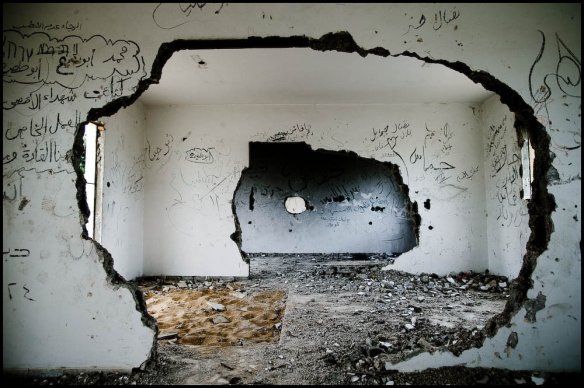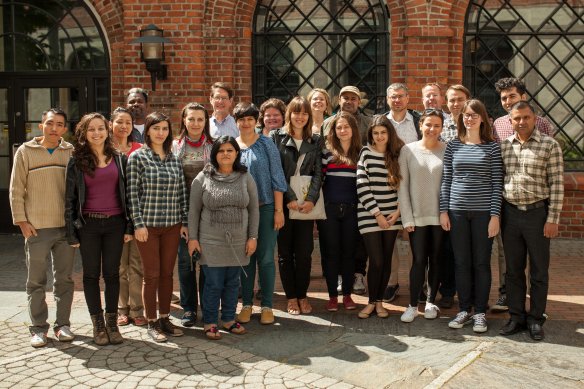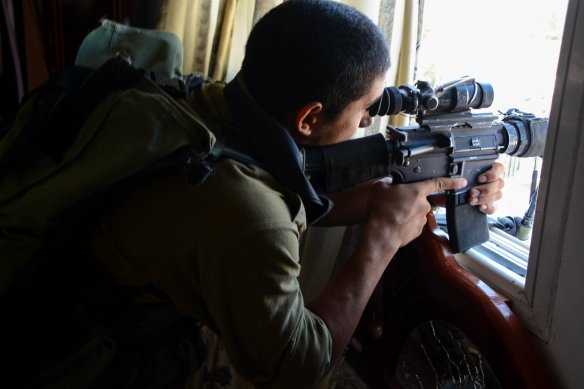Monday 11 August The US criticised the warring parties for their failure to meet the deadline for the formation of a transitional government. The SPLA-in-Opposition claimed to have killed five government soldiers in Unity State. The South Sudanese government accused the SPLA-in-Opposition of attacking Nasser (Upper Nile State). Machar concluded the talks with the Sudanese… Read more »
Research Apartheid
Academia has become its own battleground in the Israel-Palestine conflict.

The segregation of research on the Israel-Palestine conflict – or “research apartheid” – reinforces the parties’ reciprocal lack of understanding. Photo: Zoriah @ Flickr
As a scholar of the Israel-Palestine conflict, I usually leave the Ben Gurion Airport with vivid images of checkpoints, separation barriers, demolished houses, crammed refugee camps, poverty, settlements, and soldiers. Earlier this summer, before the war broke out in Gaza, I visited Israel for the first time without entering either the West Bank or East Jerusalem. Without directly witnessing the occupation, Israel appears as a different country. The Palestinian experience of the country is nowhere to be seen, whereas celebration of diversity and tolerance is everywhere. This is Israel as most of its Jewish inhabitants know it. If they hear the notion “Israeli apartheid”, they believe it is a foreign conspiracy against them. With the Palestinians out of the picture, it seems like Israel’s biggest conflict is domestic and centers on what it should mean to be a Jewish state.
Putin Picks the Worst of all Bad Choices
With the arrival of August, political expectations in Russia, informed by the long experience of setbacks and disasters, are turning negative. Second thoughts about the “victorious” war with Georgia that erupted six years ago blend with reflections on the centennial anniversary of World War I (Nezavisimaya Gazeta, August 6). At the same time, liberal-minded pundits remind the public about Russia’s 1998 fiscal default, while arguing that in a globalized world the most devastating battles are fought in the financial realm (Novaya Gazeta, August 6). Whereas, the smoke coming from the sunflower fields in eastern Ukraine, where the Moscow-backed separatist war smolders on, turns many minds from virtual to real-life battles as premonitions of a Russian intervention keep recurring. Against these forebodings, President Vladimir Putin gave marching orders last week not to Russian troops but to customs officials, imposing a comprehensive ban on imports of agricultural products from the United States, the European Union, Australia, Canada and Norway (see EDM, August 7; Polit.ru, August 7; Kommersant, August 8).
For the full text, see EDM, August 11, 2014.
The Kursk day
Tommorow is indeed the Kursk day – it was on August 12, 2000 that the proud but unfortunate submarine sunk after an explosion on board during exercises in the Barents Sea. This picture of its crew (from a BBC documentary) marks a moment of remembrace. It is rather striking that on the eve of this day,… Read more »
The Art and Importance of Teaching Peace Research
Since 1969, PRIO has organized and taught a graduate-level course on peace research for the University of Oslo International Summer School. For six weeks, students from around the world learn about the most current topics in peace research, including why conflicts start, why and how conflicts endure, how peace can be built in the aftermath of conflict, and the ethics of warfare. Approximately 15 lectures are given during the course, many of them by PRIO researchers, providing a fantastic opportunity to showcase PRIO’s research to new and upcoming peace scholars and practitioners.

Summer School students 2014 with the PRIO coordinators.
Photo: Julie Lunde Lillesæter, PRIO
State Briefing: Warrap State
Capital: Kuajok Approximate Population: 972,928. Internally Diplaced People (IDP) sheltering in the state: 8,800 Warrap State is located in the north of South Sudan, in the Greater Bahr el-Ghazal region. Warrap borders Abyei, a contested area between Sudan and South Sudan. The majority of Warrap’s inhabitants are Dinka, but Luo, Bongo and other smaller ethnic groups also… Read more »
This Week in South Sudan – Week 32
Monday 4 August An aid worker employed by Norwegian People’s Aid was killed in Maban County. The IGAD peace talks resumed. The Tonj South (Warrap) Commissioner survived an assassination attempt. South Sudanese officials in Canada announced their support for the SPLM/A-in-Opposition. South Sudanese internally displaced people expressed doubt in the peace talks’ ability to solve the… Read more »
West pushes and eases Putin toward a “Diplomatic solution” in Ukraine
Bad news hit the Kremlin thick and fast last week, but on Friday evening (August 1), President Vladimir Putin answered a phone call from US President Barack Obama, who again stressed that the Kremlin’s mounting problems can be resolved diplomatically (whitehouse.gov, August 1). Putin’s personal responsibility for the war in eastern Ukraine is apparently no longer up for discussion. Meanwhile, the West—after having vigorously mobilized a political effort to enforce far tougher sanctions than Moscow had budgeted for—is seemingly granting him an “honorable” way out. In Washington, and even more so in Berlin, there is understandable reluctance to heighten Putin’s desperation and to push him into a corner where further domestic mobilization against the “hostile” North Atlantic Treaty Organization (NATO) would be his only choice (Gazeta.ru, July 28). And yet, risk remains that Putin may be interpreting every offer for a compromise solution as a sign of weakness or as a trap aimed at undermining his credibility. Therefore, Obama did not hide his doubts about his irrationally thinking counterpart’s response to the West’s diplomatic message (RIA Novosti, August 1).
More in Eurasia Daily Monitor, 4 August 2014
Israel and Hamas are Both Just Winging It
Israel is more than three weeks into Operation Protective Edge. With over 1328 Palestinians and 59 Israelis dead, numerous commentators have weighed in on what each side hopes to gain from the current violence.

An Israeli paratrooper takes aim inside a Gazan building.
From the IDF flickr account.
The sanctions and the Arctic
In the debates on the impact of tougher sanction imposed by the US and the EU last week, one of the key issues is the scope of problems that Russia will encounter in developing the “green” oil and gas fields in the Arctic. The Economist calls it Arctic Chill, and many other media speculate that Rosneft will have to… Read more »